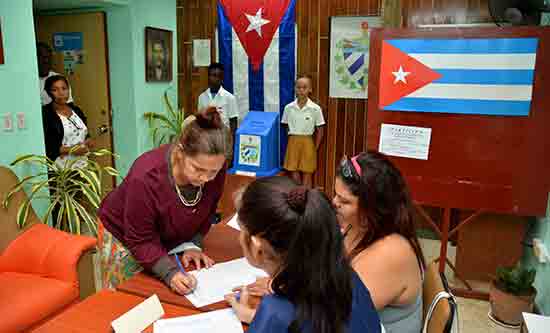
On 24 February 2019, the people of Cuba approved a new Constitution. The last full constitutional referendum in Cuba was on 24 February 1976. The Cuban socialist revolution, now 60 years old, is defined by its progressive and uniquely democratic character which enables the Cuban people to shape their political system in response to their own needs and new circumstances – an ideal which is never achieved, despite lip service paid, in capitalist Britain or the US. The democracy of the Cuban system is shown by the processes involved in developing the Constitution, during which the demands, questions and suggestions of ordinary Cubans were incorporated into the supreme law. Will Harney reports.
The revolution is permanent change
In July 2018 the National Assembly of People’s Power approved a document drafted by a Constitutional Commission. This draft was submitted for three months of popular debate and consultation. From 13 August to 15 November 2018, in neighbourhood centres, workplaces and schools:
- 133,680 meetings took place;
- 8,945,521 Cubans participated, with Cubans abroad also contributing;
- 1,706,872 spoken interventions were made at the meetings;
- these proposed 783,174 modifications, additions or eliminations to the draft constitution, covering at least 755 of the 803 paragraphs in the draft.
This feedback was then used to redraft the constitutional document; more than 50% of the proposals were included, modifying nearly 60% of the articles. Finally, the new draft was submitted to the people for a ‘yes or no’ referendum on 24 February. There was an 84.4% turnout of eligible voters. 86.8% of these voted ‘yes’, 9% voted ‘no’, 2.5% of ballots were blank and 1.6% were invalid. With this approval from the people, the National Assembly of People’s Power can meet on 10 April 2019 to agree when the new Constitution will come into effect.
Diverse forms of property
The economy will continue to be dominated by state ownership of the strategic means of production and operate according to an economic plan. However, for the first time since the revolution, the Constitution will now recognise the growing number of workers (13%) in self-employment, or in small- and medium-sized privately-owned businesses where the owner employs other workers who are not their family members. This will allow the creation of new laws and regulations for this sector.
Natural resources, current state-owned land, the means of communication and other key social goods will remain the inalienable socialist property of the Cuban people. Articles 72-73 guarantee the right to free, universal healthcare and education provided by the state, and Article 75 now enshrines the right of people to a healthy and stable natural environment, along with the duty of the state to follow sustainable development and protect the environment for future generations.
Same-sex marriage
Much attention has been focused on the debate around same-sex marriage, as the first draft of the Constitution proposed to re-define marriage as ‘between two persons’ rather than ‘between a man and a woman’. This part of the draft received more questions and objections than any other, as the consultation became an occasion for national debate on the issue of LGBTI rights in Cuba. 66% of meetings raised the issue of marriage, producing 192,408 proposed changes (24.56% of all proposals).
As a result, the definition of marriage was dropped altogether from the document, though prohibition against discrimination on the grounds of gender identity or sexual orientation was introduced (Article 42) as well as protection for all types of family (Article 81), with few objections. The specific controversy over marriage partly reflects a culture of Catholicism and machismo inherited from Spanish colonialism, but also the agitation and propaganda carried out by evangelical churches in Cuba against the proposed changes. Churches from 21 denominations printed posters reading ‘original family design, just as God created it’, and collected signatures for a petition opposing same-sex marriage. This has worked against the efforts by the government-funded National Centre for Sex Education, which under the leadership of Mariela Castro Espin has made great strides in promoting acceptance of sexual and gender diversity.
As the referendum did not resolve the question of same-sex marriage, a special provision was added to the new Constitution which stipulates that ‘the National Assembly of People’s Power will, within a period of two years after the Constitution takes effect, begin the process of popular consultation and referendum for the Family Code program, which must include the form that a marriage may take’.
Advancing towards communism
Another change which appeared in the first draft was the removal of the explicit goal of advancing towards a communist society – a stateless, classless society predicted by Karl Marx as the end-result of socialist revolution. In response to popular objections raised through the consultation, this was reinserted into Article 5: the Communist Party of Cuba, as the vanguard of the Cuban nation with responsibility for guiding the revolution, still ‘organises and orients the communal forces towards the construction of socialism and its progress toward a communist society’. The re-instatement of the goal of communism shows the profound class-consciousness of the Cuban people and the power of their revolutionary democracy.
Fight Racism! Fight Imperialism! 269 April/May 2019




